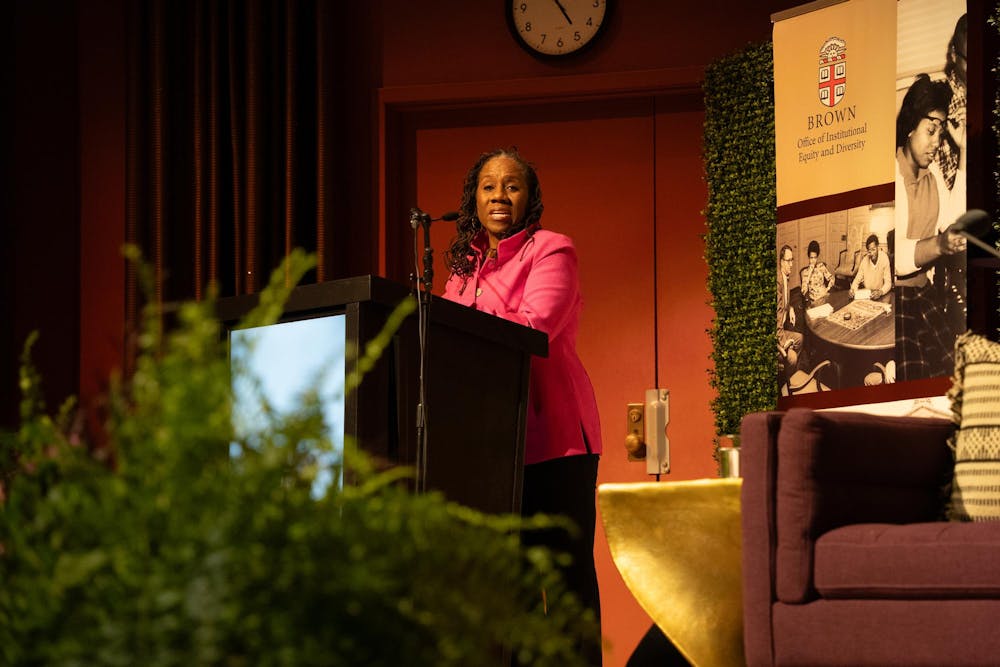Sherrilyn Ifill, the former president and director-counsel of the NAACP Legal Defense Fund, delivered the 2024 Martin Luther King Jr. Lecture Thursday at the Salomon Center. Hosted by the Office of Institutional Equity and Diversity, the annual lecture celebrates the legacy of Martin Luther King Jr., who visited Brown multiple times in the 1960s, according to the office’s website.
Ifill, who is a leading voice in advocacy for racial equality and justice, spent much of her speech reflecting on the history, legacy and nuances of the “little understood” 14th Amendment. She considers the post-Civil War Reconstruction era in which the amendment was created “the second founding (of America),” but it is rarely taught as such, she said — even though the period informs much of the modern Constitution.
That pedagogical gap partly inspired her to found the 14th Amendment Center at Howard University, through which Ifill hoped to “ground conversations of equality and justice in the Constitution” while framing citizenship rights as important for all races, not just Black communities.
Her work on racial justice formed a consistent backbone throughout the lecture. In the opening moments of her speech, titled “Reimagining a New American Democracy,” Ifill beckoned to the audience, asking: “What kind of citizenship does this moment demand?”
For Ifill, citizenship means full civic participation. “Leave no power on the table,” she said. She implored the audience to meaningfully research and engage with politics at all levels of government. This entails “understanding how uneducated many of us have been … there’s so much history that exists in plain sight, but we lack the tools to see it,” she said, referring to persisting racial and geographic disparities in the United States.
Reflecting on political polarization in the country, Ifill noted her uncertainty regarding the future of democracy. “It’s a difficult time” for institutions like governments, courts and campuses, she said — especially in an election year.
Despite her doubts, Ifill expressed optimism for the future. “We can lament, wring our hands and be deeply concerned,” she said. But “we have to be willing to take hold of power.”
“How we think about our democracy, who we think we are, is a question of our imagination,” she explained, adding that the pain caused by ideological contentions is essential to progress, and institutions like universities remain important spaces for “dynamic fights.”
Some audience members said they were inspired after listening to Ifill’s speech. “There is hope even in times that seem hopeless,” Professor of Engineering Chris Rose said. Paul Butler, another audience member, echoed this sentiment in a conversation with The Herald: “It was an incentive … to do more studying, to be more diligent … we have to look for the new paradigm.”
Members of Shades of Brown, an a cappella group that performed three musical numbers at the lecture, shared similar compliments. Music Director Makayla Mcpherson ’24 said she was “deeply moved.” Tyrone Killebrew ’24, who also spoke to The Herald, described the lecture as “a tasteful and respectful way to honor Dr. King’s legacy.”
Alongside her intermittent nine-year tenure at NAACP, Ifill also authored “On the Courthouse Lawn: Confronting the Legacy of Lynching in the 21st Century.” She currently leads the development of the 14th Amendment Center for Law & Democracy at Howard University. In 2021, Time Magazine named Ifill one of the 100 Most Influential People of the year.
“Love without power is sentimental and anemic,” Ifill said, quoting Martin Luther King Jr. towards the end of her speech. “And power without love can be dangerous and aggressive. Power at its best is love implementing the demands of justice. And justice at its best is love correcting everything that stands against love.”
Megan is a Senior Staff Writer covering community and activism in Providence. Born and raised in Hong Kong, she spends her free time drinking coffee and wishing she was Meg Ryan in a Nora Ephron movie.





